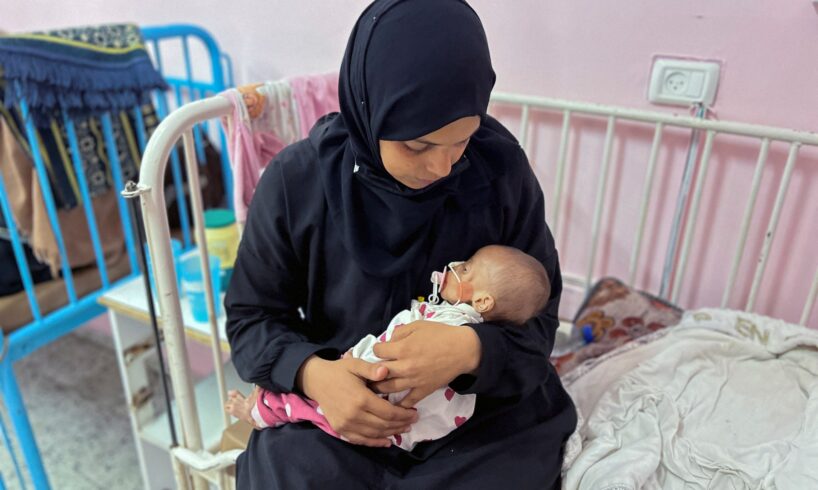
I have a big Palestinian family. I grew up in a household full of children: We are eight brothers and sisters. As my older siblings started getting married and having children, our family grew even bigger. Every weekend, our family home would fill up with children’s laughter.
I used to wait impatiently for Thursday to come, the day my married sisters would come to visit us with their children. My father would be out shopping, my mother – busy cooking her daughters’ favourite dishes, and I would be playing with the kids. I have nine nieces and nephews in total, and I have beautiful memories playing with and cuddling each one of them. They are the treasure of my family because a home without children is like a tree without leaves.
Despite the difficult life of occupation and siege in Gaza, my sisters and brothers did their best to provide for their children and give them the best opportunity to study and pursue their dreams.
Then the genocide started. The relentless bombing, the constant displacement, the starvation.
I do not have children of my own, but I feel the excruciating pain of my sisters when they face the cries of their hungry children.
“I no longer have the strength to endure. I am tired of thinking about how to fill my children’s empty stomachs. What can I prepare for them?” my sister Samah shared recently.
She has seven children: Abdulaziz, 20, Sondos, 17, Raghad, 15, Ali, 11, twins Mahmoud and Lana, 8, and Tasneem, 3. Like most other Palestinian families, they have been displaced so many times that they have lost most of their possessions. The last time they saw their home in Shujayea neighbourhood, its walls were blown off, but its roof was still standing on the pillars. The plot of land in front of their house, which was planted with olive and lemon trees, had been bulldozed.
Samah’s family has relied on canned food since the beginning of the war. Since Israel blocked aid in early March and aid distribution stopped, they have struggled to find cans of beans or chickpeas. Now, they are lucky if they manage to find a bowl of lentil soup or a loaf of bread.
Day after day, Samah has had to watch her children suffer, losing weight and falling sick.
Lana is suffering the most. She is 110cm (3 feet 7 inches), but weighs just 13kg (28.7 pounds). Her parents took her to a clinic where she was examined and confirmed to have severe malnutrition. She was registered in a programme for the distribution of nutritional supplements, but she has not received anything yet. There are none available.
Lana’s yellow body is so weak that she is unable to stand for long periods or walk in the event that they are suddenly forced to flee. All she wants is to sleep and sit without being able to play with her brother. I cannot believe what has become of her: she used to be a red-cheeked girl full of energy, who used to play with her siblings all the time.
We regularly hear news about children dying from malnutrition, and this is Samah’s worst fear: that she could lose her daughter.
Despite struggling to feed her family, Samah refuses to allow her husband, Mohammed, to go to one of the aid distribution points of the Gaza Humanitarian Foundation. She knows this is a death trap. She would not have him risk his life for a parcel of food he may not even be able to obtain.
Amid the starvation, my other sister, Asma, gave birth to her second child, Wateen. She is now two months old, and because of a lack of nutrition, she is suffering from jaundice. I have only seen Wateen in photos. She weighed two and a half kilograms (5.5 pounds) when she was born. She looked yellow and sleepy in all her photos.
The doctors said her mother, who is breastfeeding, cannot provide her with the nutrients she needs because she herself is undernourished. Wateen needs to be fed with highly saturated formula milk, which is not available because Israel has been blocking the delivery of all baby formula into Gaza.
Asmaa is now worried that Wateen may develop malnutrition because she is unable to provide her with nutritious milk. “I’m melting like a candle! When will this suffering end?” she told me recently.
My heart is tearing apart when I talk with my sisters and hear about their pain and the hunger that is ravaging their children.
The Israeli occupation forces have already killed more than 18,000 children since it embarked on the genocide. Some 1.1 million are still surviving. Israel wants to make sure they have no future.
This is not an unfortunate consequence of war; it is a war strategy.
Malnutrition is not just a severe loss of weight. It is a devastating condition that damages the body’s vital internal organs, such as the liver, kidneys, and stomach. It affects the growth and development of children and results in higher predisposition to disease, learning difficulties, cognitive impairment and psychological issues.
By starving Palestinian children, depriving them of education and health care, the occupier aims to achieve one goal: creating a fragile generation, weak in mind and constitution, unable to think, and with no horizon other than searching for food, drink, and shelter. This means a generation that is unable to defend the right to its land and stand up to the occupier. A generation that does not understand the existential struggle of its people.
The war plan is clear, and the goal has been stated publicly by Israeli officials. The question now is, will the world let Israel destroy Gaza’s children?
The views expressed in this article are the author’s own and do not necessarily reflect Al Jazeera’s editorial stance.





